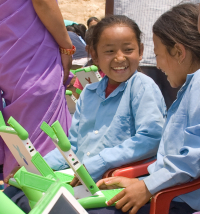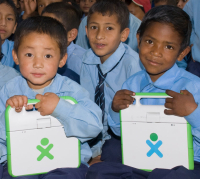One of the things that initially attracted me to OLPC was that we Nepalis could it make it our own. So often ideas and initiatives that come from the West are pre-packaged and controlled. With XO's we can localize the Sugar interface, develop activities that accord to our needs and culture, and come up with power solutions that work in our particular environments. One of the key things that we needed to localize was the name of the laptop itself. This has happened in an unexpected manner.

Enjoying their E-Paatis
When the concept of One Laptop Per Child was first being introduced and spread in Nepal back in 2006, one question that was discussed regularly in the community was: what should we call the laptops? There is no Nepali word for computer, let alone a laptop. In normal usage, computer is referred as computer written in Devnagari script.
While most people who have come in contact with a computer do have an idea of what the word refers to, we thought that the word does not do justice to the education aspect of the laptops that we were trying to highlight. Besides, the words computer and laptop have technical connotations that make the large non-tech savvy public resist to the OLPC concept at some level. Referring to the laptop as "XO" was acceptable within the OLPC community, but it was too abstract and caused more confusion outside of the community.
Many names were suggested. Some chose to call it Mero Sano Sathi, which literally means "my small friend." Others believed that it should be a single word, not a phrase like "100 dollar laptop." Other suggestions included various combinations of Nepali words for book, learning, knowledge, machine, etc. Needless to say, the community could not decide on a single name, although few continued to refer to it as Mero Sano Sathi. For me, this name just did not cut it. OLPC is fundamentally about connecting kids with other kids not about connecting kids to computers. The XO icon emblazoned on top of the XO represents the child's own agency, not a separate entity.
When Open Learning Exchange Nepal (OLE Nepal) was established, the group decided to give itself the Nepali name Sajha Sikchha E-Paati after much discussion. Sajha in Nepali means open and public. This was important because we believe that quality education should be freely accessible to anyone and everyone. Sikchha means education. Paati in Nepali means a board, and is used in words like Kalopaati (blackboard) and Kharipaati (wooden predecessor of the blackboard). Paati also means a gathering place or public shelter. For our purpose, E-Paati stands for digital or electronic learning platform.
One of OLE Nepal's main strategies to implement OLPC project in Nepal is to develop interactive digital learning activities based on Nepal's national curriculum to go with the laptops. These activities are designed with the goal of integrating laptops in daily teaching-learning process in and outside of the classrooms. We called this set of learning activities E-Paati when we developed the first ones back in the fall of 2007.
The second part of our strategy is to ensure that teachers are well prepared to not just use laptops in classrooms, but to use them effectively to deliver quality education to their students. With that in mind, we held an extensive teacher training program that included a four day residential training a month before laptops were deployed at the two test schools. This was followed by a three day onsite program right after deployment in April 2008. Most of the teachers from the poor rural schools had never even used a computer before they came to the residential training.
During the course of the program, the teachers started referring to the laptops as E-Paati. Then it occurred to us that it was an apt name for the laptops. While a community of tech enthusiasts, education specialists, and volunteers had not been able to come up with a Nepali name for the laptops, it was a natural choice for the teachers - the users of the XO's - who at some time used Kharipaati, and now use Kalopaati in daily classroom teaching. With these laptops, teachers now have a powerful tool that teachers and students in Nepal refer to as E-Paati. Personally, I love the name E-Paati because it connects Nepal's past with its future.
That left us with the task of finding a different name for our set of digital learning activities. Calling both the laptops and the activities by the same name created confusion in the classroom. For example, when teachers ask students to close their E-Paati, students were confused whether to close the activity or turn off the laptops. It was important to make a clear distinction between the content (activities) and the hardware (laptops).
Once again, many names where suggested, and out of the many great suggestions, we chose to call the learning activities E-Paath as suggested by our Education Director Dr. Saurav Dev Bhatta. For those of you who are still struggling with their Nepali, Paath means lesson. However, we want E-Paath to mean more than just digital lessons. We want it to stand for interactive digital lessons that children find easy and fun to use.
Currently in Nepal, there are two test schools in the outskirts of Kathmandu Valley where 135 students and 20 teachers are blazing the trail to transform education in Nepal using E-Paath on their E-Paati. It makes me proud to see how we have made this project our own - starting from the implementation plan that suits our needs and environment, to the localized content that Nepali children can relate to easily, all the way to the names that reflect the noble- yet intimately local - initiative.
Rabi Karmacharya is the Executive Director of Open Learning Exchange Nepal, a Nepali NGO working with the Nepali government on Nepal's OLPC test schools Vishwamitra and Bashuki. He blogs regularly about Nepal's OLPC test schools on the OLE Nepal blog.



I am looking for a way to use "E-Paati" myself. Much, much better than "laptop".
I like it much more than "laptop", which is both a non-native word and does not cover it's use.
Winter
Could someone spell "E-Paati" phonetically for me please?
E-Paati -- ee - pah - tee
E-Paath -- ee - pah - 'th' the th is t aspirated not th as in the. I still can't say it right after 21 months in Nepal.